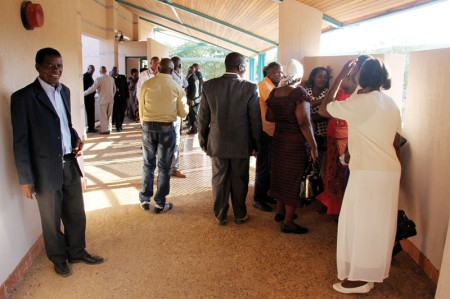How govt lost to the Caprivians
Mpho Mokwape | Thursday March 24, 2016 11:36


Amidst all the controversies, arguments and counter-arguments surrounding the planned deportation of the plus-900 Namibian refugees at Dukwi, the central matter in the court case before acting judge Jennifer Dube was whether any threats awaited the refugees if they were returned to their motherland.
International and local law protect refugees from ‘refoulement’ or the principle, which forbids the rendering of a true victim of persecution to his or her persecutor.
The Namibian government had long said the refugees were not only welcome back, but in fact various types of monetary and material freebies were awaiting them.
The United Nations High Commission for Refugees and the Botswana government were also in agreement that the threats that had once existed in Namibia, were no more.
On the other hand, the refugees were loud and clear that all forms of danger, from torture, imprisonment and even death were waiting on the other side of the Chobe River.
Judge Dube had to look at the evidence at hand, which included the now famous Go and See, Come and Tell Mission report as well as a High Court of Namibia judgment allegedly proving that some previous returnees had been charged, convicted and sentenced for serious offences.
With all eyes upon her, Dube explained that the Tripartite Agreement signed by Botswana, Namibia and the UNHCR in 2002 clearly stated that no refugee was to be compelled to return home against his or her free will.
“Article 6 (1) of the Tripartite Agreement states that ‘the contracting parties agree that the voluntary character of repatriation shall be fully respected and that no refugee shall be compelled to return against their free will,’” Dube said.
However, it appears the issue of whether government itself thought the refugees would be safe, was a game changer in the court case.
Dube explained that before she arrived at her decision, she had to appropriately ascertain whether government through the Minister of Defence, Justice and Security had an obligation to assure the applicants of the safety on their return to Namibia.
“Without the government’s clear position on the safety of Namibia for the refugees, the applicants established a clear right and made a case for an interdict against the government,” she said.
In her reasoning Dube said upon perusal of the Go and See, Come and Tell report she could not establish the position of the Minister of Defence, Justice and Security on the safe return of the refugees, despite the report having required him to do so.
The report was among the most important documents in the case as it carried the results of an observer mission of Botswana government officials, NGOs and a select group of refugees into Caprivi last June. The mission was cut short after the Namibian government accused the refugees of ‘politicking’.
According to Dube, it was well explained that the mission was to give an insight into whether the environment in the Caprivi (now Zambezi Region) was conducive for the repatriation of the refugees in safety and dignity.
She further explained that in the tripartite agreement, the parties, being the governments of Botswana and Namibia had agreed on a set of written objectives, procedures and regulations in relation to the voluntary repatriation and reintegration of Namibian refugees being the provision for general amnesty, safety and security for those repatriated.
“Now the crux of the refugees case is that the repatriation process lacked the assurance that the reasons for which the refugees fled no longer existed.
As such, they fear the risk of being persecuted should they return home. Part of the assurance was to embark on the mission in order to assess the status of the country where the refugees would be repatriated to,” she said.
Dube noted that despite persistent requests, the government never provided the refugees with the results of the Go and See, Come and Tell report until she ordered them to do so on January 4, 2016.
The judgment on December 9 in the High Court of Namibia also sealed victory for the refugees.
The refugees successfully convinced Dube that the Namibian High Court judgment showed that the possibility of prosecution in relation to the 1998-1999 disturbances in the Caprivi was a very real threat.
“This judgment is relied upon by the refugees in their papers saying that the accused persons were all members of the banned United Democratic Party, some of whom were Dukwi residents who repatriated back home,” further read the judgment.
The brief scope of the matter is that on December 29, 2015, 732 Namibian refugees led by Felix Kakula, filed an urgent application at the High Court, among others seeking to interdict the government from deporting them back to Namibia.
This was a result of a press release issued on May 12, 2015 that the refugee status of Namibian refugees originating from the Caprivi Strip was to come to an end by December 31, 2015.
The refugees were encouraged to voluntarily return home by that date, failing which they would be dealt with under the immigration laws of the country.
